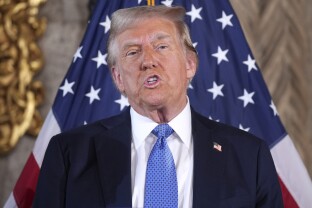President Donald Trump said Monday that his new executive order would quickly lead to major reductions in prescription drug prices.
“Some prescription drug and pharmaceutical prices will be reduced almost immediately by 50% to 80% to 90%,” he said at a press conference. “Big Pharma will either abide by this principle voluntarily or we’ll use the power of the federal government to ensure that we are paying the same price as other countries.”
He said the U.S. will “pay the lowest price there is in the world. We will get whoever is paying the lowest price — that’s the price that we’re going to get.”
It’s not yet clear which medications will be targeted or precisely what the savings will be to consumers, although White House press secretary Karoline Leavitt similarly promised on Fox News Monday morning that the administration’s policies would reduce the cost of drugs in the U.S. by “more than half, at least.”
It’s likely to face opposition from the pharmaceutical industry, which pours millions of dollars per year into lobbying the U.S. government. Shares for multiple drug manufacturers fell on Monday morning ahead of the anticipated announcement.
Trump’s attempt to lower prescription drug prices was blocked in court during his first term over failure to follow appropriate rulemaking processes.
The new order will encompass “an aggressive suite of reforms” to bring down the cost of drugs, a White House official said earlier Monday when previewing the order.
“The president is dead serious about lowering drug prices,” the official said.
The order directs the secretary of Health and Human Services to set clear targets for price reductions across all markets in the U.S. and negotiate with the pharmaceutical industry, White House officials said. If progress isn’t made, the administration will impose “most favored nation” pricing through rulemaking, they said.
If pharmaceutical companies do not want to “come to the table” to offer U.S.-preferred drug prices, then there will be “a series of actions” for the HHS secretary to take, the White House official said.
White House officials said that there also could be “action on anti-competitive measures,” which would require that the Justice Department and the Federal Trade Commission become involved.
The executive order directs the Office of the U.S. Trade Representative and the Department of Commerce to “take all appropriate action against unreasonable and discriminatory policies in foreign countries that suppress drug prices abroad,” the official said.
Unlike the United States, many European nations regulate the price of prescription drugs. According to an HHS study published last year, in 2022, U.S. prices across all drugs were 2.78 times as high as in other countries studied, which included France, Japan, Mexico and Canada.
The White House official said there wasn’t a particular class of pharmaceuticals that the executive order would be targeting, but would instead be aiming to decrease prices where the disparities between U.S. pricing and pricing abroad are the widest.
When asked what legal authority the administration had to become involved in drug negotiations in other countries, White House officials suggested that the USTR and the Commerce Department’s involvement gave the government that ability.
“So there is authority … for USTR and Commerce to be able to take action against unfair and discriminatory practices by foreign countries against U.S. companies, as well as there is action on the lines of anything that may impair United States national security,” the official said.
Under the executive order, the Food and Drug Administration must consider expanding importations with other developed nations beyond Canada. On May 5, the president signed an executive order that directed the FDA to find ways to ramp up drug manufacturing domestically. Another executive order was signed on April 15 taking actions that the White House said would reduce drug costs.
Trump attempted during his first term to institute a “most-favored nation” drug pricing policy. A federal judge blocked the rule in the administration’s last few months, arguing that officials had failed to follow appropriate rulemaking processes.
White House officials told reporters this effort would be bolder and broader than attempts in Trump’s first term.
“This suite of actions is broader than that, and the expectation should not be that we will just be pursuing the same,” the official said. “We have moved on from that for broader action.”
—
Violet Jira is a NOTUS reporter and an Allbritton Journalism Institute fellow. Oriana González is a reporter at NOTUS.
Sign in
Log into your free account with your email. Don’t have one?
Check your email for a one-time code.
We sent a 4-digit code to . Enter the pin to confirm your account.
New code will be available in 1:00
Let’s try this again.
We encountered an error with the passcode sent to . Please reenter your email.


